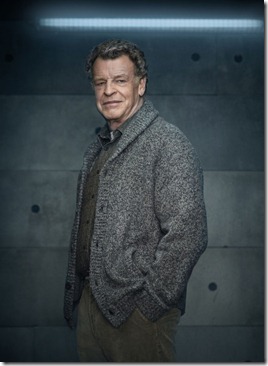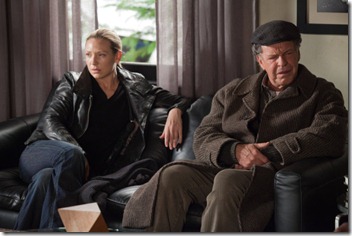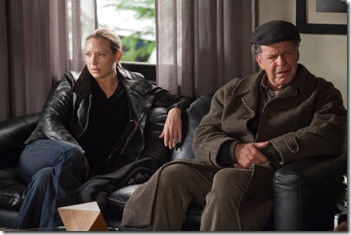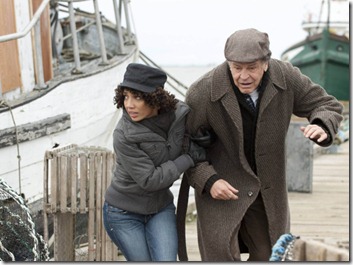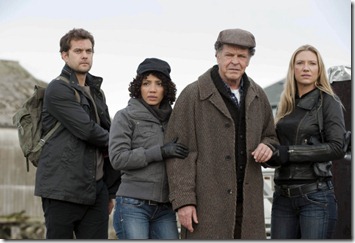Fox’s cult favorite series Fringe (Fridays, 9/8C) airs its penultimate episode, The Boy Must Live, this evening. Yesterday, John Noble – who plays variations on the theme of Walter Bishop (if you watch regularly, you know what I mean) – took half an hour to speak with us from his home in Australia.
He talked about the fans who’ve kept Fringe on the air long enough for it come to an actual conclusion; he talked about which version of Walter was the most fun to play – and which was the hardest, and he shared with us the reason he thinks that the Fringe finale (airing next Friday with the show’s final two episodes back-to-back) is the perfect ending for the series.
Josh Governale (Fox): Good morning and good afternoon everyone. Welcome to The Fringe conference call with series start John Noble, who’s calling us from Australia. So please be aware that there might be a delay. In addition, I want to remind you that the series finale of Fringe will air on Friday, January 18th. So now without further delay, I’ll turn the call over to John Noble.
John Noble: Thanks, Josh.
Governale: John, did you have some opening remarks or do you want to just go right into question and answer?
Noble: We haven’t got much time, but obviously this is a wonderful opportunity to acknowledge the support that all the people listening have given us over the last five years, which is really terribly impressive and probably the reason we’re still on the air. So I say thank you to everyone for that and simply say I think we finished the series off as well as I could possibly have dreamed of, as I hope will be evident in the next couple of weeks.
I love the show and Walter. It seems like it’d be really fun to play him. He does so many crazy things and has so many idiosyncrasies. What’s your favorite Walter moment?
Noble: Which is my favorite, Walter really, because I’ve played a bunch of different versions of him. Gee, I don’t know. I loved it when he was being random, which was probably the original version of him more than anyone else. I loved doing Walter then and all of the different mental states that we’ve played in during the time, but when he was being completely random and had very poor social skills.
I loved the scenes that he played with Peter, the connecting stuff that I played with Josh Jackson over the five years. Both of us really loved doing that work. There were so many different aspects of Walter, the comedy and drama and emotion and so forth. He was a fully-fledged character. So it’s hard for me to say what my favorite one was, but probably—Fringe is essentially a love story and so the scenes where he had close connection with Peter, but also with Anna’s character or Jasika’s character were very special to me.
You made me think, was it hard keeping the different Walters separate in your mind?
Noble: Not really, no. I think the writing was there for me to play and the situations were such that—Look, at times it was tricky. I had to be a …. I’ll be honest with you, that I didn’t drop into the mannerisms of another version of the character, but I guess I was pretty alert to that. I used to have people on set saying, ‘Can you keep an eye open for me to make sure I don’t do Walter version … or something?’ And sometimes particularly my camera operators would take five and say, ‘John, that’s the wrong one.’
John, what do you take away from the Fringe experience this past five seasons?
Noble: Doing something of this nature was new to me. I’d never done anything that required a five-year commitment. To build a show that seems to have kept the imagination of the world so much was a bit other worldly to be honest with you. I would go to anywhere in the world really and people would stop me in the street and talk about Fringe and how much they adored it and asked questions about it.
The international reach of Fringe, I think, still catches me by surprise a bit at times. Also, I was given the gift of a character that is every actor’s dream. So you combine those two factors and it’s been an incredibly memorable five years.
What are going to miss about working with Josh and Anna and Jasika and the whole cast?
Noble: I guess because I’m the older fellow there I kind of think of them all as my kids in a way. I have a very special love for all of those actors and I’ll miss them. Over the five years we were given the change to develop some pretty close bonds, both with our characters and personally, and we did. I don’t really know how to explain it any other way than that. It’s something that we earned over five years. It probably wouldn’t have been there with two years, but with five years it was definitely and is definitely there. It’s probably a life-long bond, I imagine.
Walter has, it seems like, a big sacrifice coming his way in these final couple of hours. How is he handling the potential threat to his life and what that might mean for Peter in his absence?
Noble: Gee, you know something I don’t know. You’re a cheeky one aren’t you? You always are. Walter is—where are we? Episode 11. We know that something radical has to happen in order to beat the Observers. I think by now we’ve built up to the fact that possibly maybe Walter has to do something pretty outstanding to make this happen.
More importantly, I think, what you’ll find is the way that his relationship with Peter plays out over the next two episodes, and in particular, the finale is really quite remarkable. That’s something we had to do because we spent so much time and I know that the fans love the relationship between Peter and Walter so much and we certainly paid homage to that and brought it home, I believe, really strongly.
I would love to have had an episode with each of the characters. I do have some beautiful moments with Jasika and Anna as well. It’s good story writing in the sense that they’ve built this great big arch and they’re going to pan out. I’m not going to tell you exactly what happens, obviously, but we do get the payout. And it’s also wonderful to have Mike Cerveris back into the equation again. He’s also been—aside from the fact that he’s an amazing actor and a friend of mine; he really does add another element to our story telling.
I wonder if you could take me to two specific moments. First, your gut reaction once you read that final script and saw every little nuance of how the story ended. And then your last moment of production, that last day that you spent on set in this character.
Noble: For the first one, I was naturally, I think we were all apprehensive to see what would happen in the finale. We didn’t know until really quite late in the piece how Joel would finish it off. I can honestly say that it was everything that I had hoped it could possibly be. When I read it I thought that he had done a masterly job in writing in, tied up our character lines, tied up the great story arch. I couldn’t imagine a better job, to be honest with you. So I was extremely elated when I read the final episodes.
The last day on set was really quite fun. We were all kind of buoyed up. It was one of those nights that go forever. I think we finished at 9:00 in the morning or something, but we had a lot of fun. I can remember we all got a fit of the giggles halfway through the night, which is probably really inappropriate. All of us were doing a scene together. I don’t know. It was just hilarious. I couldn’t get my lines out, which is very unusual for me. I just kept getting it wrong and we were all laughing a lot. But it was good fun. We had a wonderful time.
The last scene I did was a beautiful scene with Michael Cerveris, but backstage all the rest of the … were on set as well, as we do in most scenes. You give your speech afterwards and so forth. I felt really buoyed up afterwards. I didn’t feel depressed. I thought that we’d really had a great finale. The last day was so much fun.
Does a job this good make it tricky to pick the next one?
Noble: Yes, absolutely. I think following up with—I suppose my last two characters have been Denethor and Walter Bishop. Both will be hard acts to follow. So I don’t know really, that sort of sits in the hands of my managers at present. I just have no idea what’s going to be offered to me. I’m looking forward to it though. I’ve had a month off now so I’m ready to start work again.
Now that it’s all finished and the show has had so many interesting narrative spreads that it’s gone with and some that have been shorter and some that have been longer. Just … playing Walter and the different versions of it where there any other storylines that you wished you could’ve lingered on or gong a little deeper with because you just enjoyed or were intrigued by the story and where it was going?
Noble: No, really, I think the main story lines are what always intrigued me, with those that were the relationships between the characters against whatever backdrop, whether it was in an ordinary universe or a universe in the future. I think the glue that held Fringe together was the relationships.
I know the other characters feel the same. They were the things that we really looked forward to doing. Despite what was happening was around us we would have these tenuous, sort of incredibly real and deep relationships with the other characters. Whatever situation we were in, those relationships, I believe, still carried the day. They were the things that made Fringe work.
So I think we have played those storylines out. I could look back and think, ‘Gee, I wonder what every happened to … or something of that nature, back in season two,’ but it doesn’t really concern me because what we, the body of actors, the body of characters, did was continue them anyway.
What about you? Do you miss anything?
No. I mean I always love seeing you and Bell. Those were always really great. So it always felt like whenever we got those moments, whether it was just their friendship, Anna played him, it was still really wonderful to see that relationship between the two of you.
Noble: Thank you.
I have two questions. One is this show has taken such 90 degree turns narratively, almost by surprise, I’m wondering if the cast is surprised or has been in the past? You know, at what point do you find out? Do you see a script and say, ‘Oh gosh, I’ve got another Walter to play?’ Or do they apprise you ahead of time that this is where it’s going?
And the other question has to do with the final episode. I know in general terms you can’t say anything much, but referencing T.S. Eliot, is it a bang or a whimper?
Noble: Certainly we were surprised. I supposed an example that would encapsulate that surprise is the time that, I think in season two, when we were told to go into a sound studio and record our voices for singing. We didn’t know why. We said, ‘Why are we doing this? I don’t understand.’ And of course it was for the musical episode (Brown Betty), but we didn’t know until we got the script really what we were doing. Suddenly we found out we were in this bizarre musical, which was huge fun to play, but we didn’t know ahead of time.
So often it was the case that we wouldn’t know which way it was going to go. That’s okay. As actors, you don’t actually need to know the future of the character. You just need to know the backgrounds. Those major shifts into the alternate universe and so forth, which were really challenging, I always found the flashbacks really interesting.
When I had to do a few episodes of flashback with the full prosthetic makeup and so forth and flash forwards and flash sideways, but the good thing about those things is they keep you very alert. There’s no room for boredom or getting empathetic in there. I always loved the challenge. When something new happened I always used to get quite excited.
And the finale?
Noble: Well it’s certainly going with a bang. As I mentioned just a moment ago, I think it’s one of the best—I couldn’t have imagined a better finale to be honest with you. I read it and I was like, “Oh my goodness me, he’s done it. He’s done it.” He’s answered all these questions and he’s tied off all these things that were that I had to ask. So I think he’s done an—well I hope history will judge it as one of the great finales of all time. I really believe they will.
You’ve played probably dozens of variations of Walter, if you get down into really, really picky areas, but I find there’s four major ones from which they all spring. There’s Walter, Walternate, Post-Machine Walter, and Post-Peter’s Return Walter. I’m just wondering which one was easiest to find, in terms of the character’s voice, and which was the hardest and which one was really the most pure fun?
Noble: Going backwards, the pure fun was the original Walter, who was just released from a mental institution and probably shouldn’t have been. He was just fun because he could basically say and do anying and get away with it. The most difficult Walter was the one that I had to play when there was no Peter in the world. That was really tricky. I think it was the beginning of season four. It was really tricky to play that same character but without the relationship with the son redeeming himself. He was really quite a—he wasn’t a well fellow. I mean I played him with a lot of OCD attributes. He really wasn’t a very pleasant man. I found that one the most difficult to play.
I loved playing Walternate because he was the same character actually, completely the same character, version 1985 and then it developed in such a different way physically and mentally. So to be able to play that in the same television series as playing the other ones was a fantastic gift to me.
So you’re also hosting the Science Channel’s Dark Matter series. Have you always had an interest in science or what that somewhat inspirited by working on Fringe?
Noble: Over the last let’s say 25 years, since a lot of science writing became accessible to the layman, I’ve become quite a consumer of science. As a child, I wasn’t streamed into science as I went into the humanities and I regret that now. I regret that that situation exists because to be honest with you I find science really sexy and at the time that I was a school kid it certainly wasn’t.
So probably the last 25 years, with science becoming far more accessible to all of us, I’ve become a pretty avid reader and devourer of it. One of the objectives that I have working with Fringe channel is to get more people talking about it because it’s such fun. That’s something that I discuss with Fringe channel people quite often.
And after playing Walter for five years has any of his quirkiness crept into your personality?
Noble: I don’t know, probably. I don’t know where the line is. I don’t know how much of myself is in Walter. There’s got to be a bit of him there. But no, I don’t have any food fetishes or anything of that nature. But I love having played Walter because I suppose any actor brings a certain aspect of their own personality to their work and so I was able to—I had a fairly broad canvas to paint on there with the different versions. I guess there’s a lot of me in there somewhere.
You are absolutely fantastic as Walter. I was just wondering if there was anything in general you could share about working on Fringe that may surprise fans? Something they may not know.
Noble: That’s a hard one because we’ve had such a close relationship with the fans. This has been made possible through social networking and the Internet now. We have much more contact and we do go off to things like Comic-Con. So I think people know most of our secrets, the day-to-day runnings of things.
Working in television is very hard. I think people know that. Just the pure demand of it can really take it out of you physically and mentally, but I think our fans are pretty aware of that anyway. So no—is there something specific you have in mind, an example?
Just maybe if there was anything that’s been more difficult to play than others or—
Noble: These characters are complex. Walter, let’s talk about my character, is incredibly complex. I look at every scene working out—I do a lot of thinking about the work I do and trying to get the rhythms into scenes. You’re always working with the relationships and trying to trail along another one or two or three or four or five years of relationships in behind them with different mental states.
It’s pretty demanding, but then again I love that so I wouldn’t say it was …. It was just doing the job or trying to do the job properly. It was never a job that you could sit on our laurels or rest on your laurels, which I didn’t think anyway.
It seems like it would be very challenging but a lot of fun at the—
Noble: Could you—you’re just breaking up a little bit. Could you say that again please?
I’m sorry. It seems like it would be very challenging to work on that show, but very fun at the same time.
Noble: That summed it up perfectly. It was exactly that. It was very challenging and particularly—it’s basically 43 minutes of television and we were shooting that in a week. So the demands on our time were—we really had to be on the ball and we were working with an amazing crew who were doing—
I mean I used to say, a week would go by and I would say, “Well that’s … how on earth did we shoot another episode?” but we did, and particularly in the final season when we were shooting seven-day episodes with a reduced budget and big special effects. But the team was so polished by them that we were able to do it and I think with incredible results.
What do you think was the most rewarding thing about playing Walter?
Noble: I suppose when you start up in acting you hope to be given challenges and you always have dreams about the things you could do and couldn’t do, but normally we get pigeon holed a little bit as we go on in our careers. We often get pigeon holed as a tough guy or whatever else we get pigeon holed in. I’ve sort of been, I guess, pigeon holed as sort of a heavy, serious, almost a baddy but not a baddy over the years of my work in television, particularly.
It was wonderful to be able to play a character who had so many colors, who was able to play comedy, to play incredibly vulnerable, which he did a lot of the time, to play the love story, to play the relationship with the son, which is quite unusual, particularly—I think it’s one of the strengths that fringed the relationship between the man and his son that makes it unusual and special. That’s a gift to me, as an actor. It was like everything you could possibly hope for and not only that but to play it out over five years. So I was a very lucky actor.
You probably answered this already earlier, but how do you hope fans react to this finale?
Noble: The finale, I believe, I think it’s the best finale I’ve ever read, just in terms of being able to tie up the five years, five years of intense work. To be able to pull it together as the way that Joel Wyman did is quite remarkable to me. So I honestly think the fans will be—well they’ll be disappointed. There’s no question because the series is finishing, but I think they’ll be very thrilled and honored by the way that Joel has made that happen.
Obviously we don’t know what’s going to happen to Walter at the end of the show, but regardless of that in some timeline I’m sure he’ll be fine. What would you like to have seen happen to Walter that didn’t, if you could’ve written a script?
Noble: No, nothing. I think what he’s done with Walter is absolutely perfect. If you had asked me in season one where I thought Walter should finish up, it would’ve been exactly where he does. That’s the remarkable thing—when I say I think it’s a great finale that’s the reason why. I think it’s the perfect out for Walter.
I’m truly grateful to the writers for giving me that, because over the years when I’ve spoken about the character with them I’ve always felt that this would be the perfect way to end and complete his journey, to complete the journey of this series and they gave it to me. So I’m incredibly grateful. I wouldn’t have wanted it any other way.
How do you choose your roles?
Noble: A lot of the times roles are chosen for us, to be honest with you. Something will be offered. I don’t know, it might be different for people that are A-list actors, but a lot of us really look at what’s offered to us and look for something that sort of has some traction with other people. But it’s not like I read 100 scripts a week and sort of pick and choose. Maybe some actors do. I certainly don’t do that.
I’m a character actor, as against a personality actor. So as a character actor I’m always looking for something interesting. I remember when I read Walter, for example, and that was now six years ago, I said, ‘This is the role for me.’ I said that to my family, ‘This is the role for me.’ So there was something there that I knew was absolutely right, and that was just based on the … of the character. So that’s when gut instinct comes into play I think. I know there are certain things I won’t do.
Looking to the future, one of the other projects you’ve got coming down the line is the Superman: Unbound animated movie where you’re going to play the villain Brainiac. Did you find it was easier to transition into that role considering your experience playing sort of the mad scientist version of Walter?
Noble: Doing animation is great fun. It’s like a different world. You basically go in there and it’s all in the imagination. There aren’t even pictures up there to look at. As you know, you usually go in there and create, working with whoever the director is; you just create this voice and this character. Later on maybe you’ll have a look at the picture associated.
For me, it’s a totally different process than doing a film or a stage play, but I love it. It’s incredibly intense work but I love doing the voice work. And then at the end of the day it’s like the prize to see some huge monster with your voice attached to it. The two to me are technically in different ballparks.
Photos by Cate Cameron, Liane Hentscher and Kharen Hill/Courtesy of Fox Television
